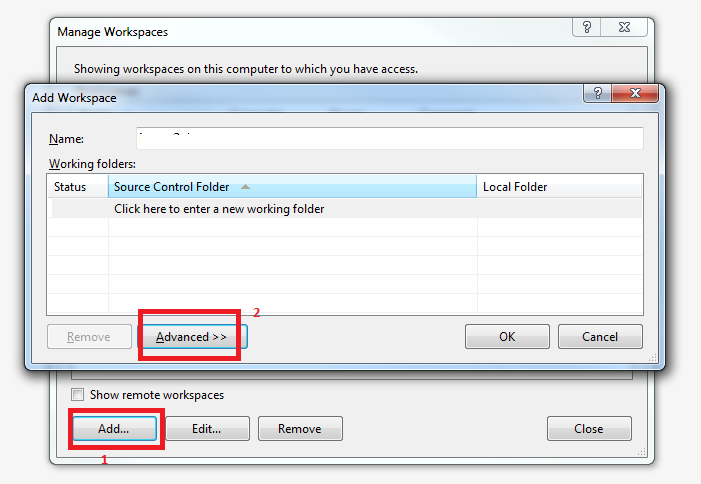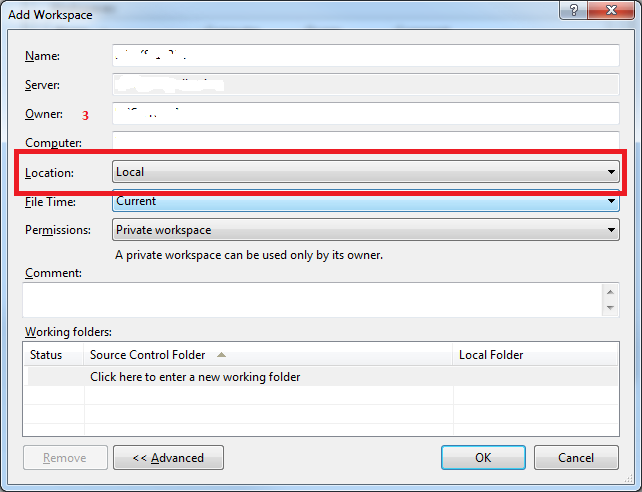by XDK
8. January 2014 12:08
Explanation:
Visual Studio/Team Explorer/MTM remembers your last credentials, So that you need not enter the login credentials everytime you connect to TFS. This will be a problem when you try to login as a different user.
Solution:
Perform the following steps to clear the credentials cache
- Goto windows control panel --> "User Accounts" --> "Manage your credentials"
- Search for your TFS url in the list --> Expand the TFS url credentials in the list
- click "Remove from vault" button

by XDK
8. January 2014 10:14
Explanation:
You can now add Test Plan and Suite Management to the list of testing features available in Web Access.
Following are the tasks that can be done using web access
- Create a test plan
- Add/Create a test suite,static test suite and query-based test suite
- Add/Create test cases and Shared steps
- test case execution
- Status check after test case execution
- Change the steps during execution
The differences between the local MTM and Web access is in the collection of diagnostic data (video, screenshots, IntelliTraace, code coverage). The collection of this data is only supported on a locally installed MTM
by XDK
29. December 2013 06:45
Explanation:
You are opening a solution made in Visual Studio 2010 with VS 2012. When you run Code Analysis you get a series of CA0053 errors, saying it is unable to load the rule sets from the Visual Studio 2010 directory
In the Error window you get an error message saying “Code Analysis detected errors.” And in the Code Analysis window you will get the “CA0053 Error running code analysis” with its “Unable to load rule assembly”.
This means the project is bound to Visual Studio 2010, where it should have been Visual Studio version independent. The absolute path to the Visual Studio 10 binaries is what causes the problem.
What has happened was that this certain VS2010 specific information was “inadvertently” introduced in SP1, and it has not been fixed in any later update. It does NOT happen if you run in Debug|x86 or Release|x86, but any other configuration you have added will give you this error.
Solution:
Tool to fix the errors available at http://visualstudiogallery.msdn.microsoft.com/471da13b-d415-4a44-a4e9-a8222316b902
by XDK
19. December 2013 19:19
Explanation:
TFS 2012 and VS 2012 featured with new workspace concept called “local” workspaces.The workspace concept which was available from VS/TFS 2005 - 2010 is called as “server” workspaces. “server” workspaces is the default option while creating a new workspace in VS 2012.
When a local workspace is created, the required data structures will be moved from the TFS server onto the TFS Client. The data structures are local to local machine instead of being hosted on the TFS server. Moving the data structures to local machine gives VS 2012 the ability to perform a number of source control operations without TFS web service calls or active connection to TFS server. The following operations continue to work when the local machine is disconnected from the TFS server.
- Opening a source-controlled solution
- Checking out a file for edit
- adding a new file or folder for add
- Delete on an existing file or folder
- Rename on an existing file or folder
- Monitor pending changes in the workspace
- Undoing pending changes
- Diffing your copy of a file with the version of the file your change is pended against
- The local workspace will not carry read only bit during get source.
- “Promoting” the candidate adds and/or deletes
- The local workspace will be invisible to VS 2010 and earlier versions
- No enforcement of PendChange permission or checkout locks
- The local workspace can be converted to Server workspace and reverse the same
Drawback on Local workspaces.
Local workspaces have scalability limitations due to their use of the local workspace scanner which checks for edited items.If the workspace has more than 50,000 items, There may be performance problems or "TF400030 errors as operations exceed 45 seconds in duration." may occur
Steps to create a local workspace.


by XDK
19. December 2013 08:36
Exception:
"TF400030: The local data store is currently in use by another operation. Please wait and then try your operation again. If this error persists, restart the application.”
Explanation:
The error occur when using local workspaces in Visual Studio 2012 or later
TFS 2012 and VS 2012 featured with new workspace concept called “local” workspaces.The workspace concept which was available from VS/TFS 2005 - 2010 is called as “server” workspaces
When a local workspace is created, The required data structures will be moved from the TFS server onto the TFS Client. The data structures are local to local machine instead of being hosted on the TFS server. Moving the data structures to local machine gives VS 2012 the ability to perform a number of source control operations without TFS web service calls. The following operations continue to work when the local machine is disconnected from the TFS server.
- Opening a source-controlled solution
- Checking out a file for edit
- adding a new file or folder for add
- Delete on an existing file or folder
- Rename on an existing file or folder
- Monitor pending changes in the workspace
- Undoing pending changes
- Diffing your copy of a file with the version of the file your change is pended against
- The local workspace will not carry read only bit during get source.
- “Promoting” the candidate adds and/or deletes
- The local workspace will be invisible to VS 2010 and earlier versions
- No enforcement of PendChange permission or checkout locks
- The local workspace can be converted to Server workspace and reverse the same
Local workspaces have scalability limitations due to their use of the local workspace scanner which checks for edited items.If the workspace has more than 50,000 items, There may be performance problems or "TF400030 errors as operations exceed 45 seconds in duration." may occur
Reconciled operation on the server or deadlock between two operations may also trigger the error.
In Local workspace architecture, only a single operation (thread) can use this local data at a time. If two pieces of system want to use the data store simultaneously – perhaps the Solution Explorer and the Source Control Explorer both want to refresh after an Undo operation was performed – then these two components have to take turns to use the local data store. One will wait for the other to finish, and who gets to go first is arbitrary.
The ‘loser’ of the race has to wait before proceeding, but will only wait for about 45 seconds. If he ends up waiting for that full amount of time, but still doesn’t get the chance to use the local data store (because some other component of the system is still using it), then this error will be raised.
Workaround:
- keep the size of the local workspace from growing too large, files and folders less than 50,000 items
- Avoid working with extremely large sets of pending changes (10,000+) for a long time without checking in. This helps to keep ‘reconcile’ costs low
- Install Visual Studio 2012 Update 2 or later to get protected from the deadlock scenarios
- Convert the local workspace to server workspace